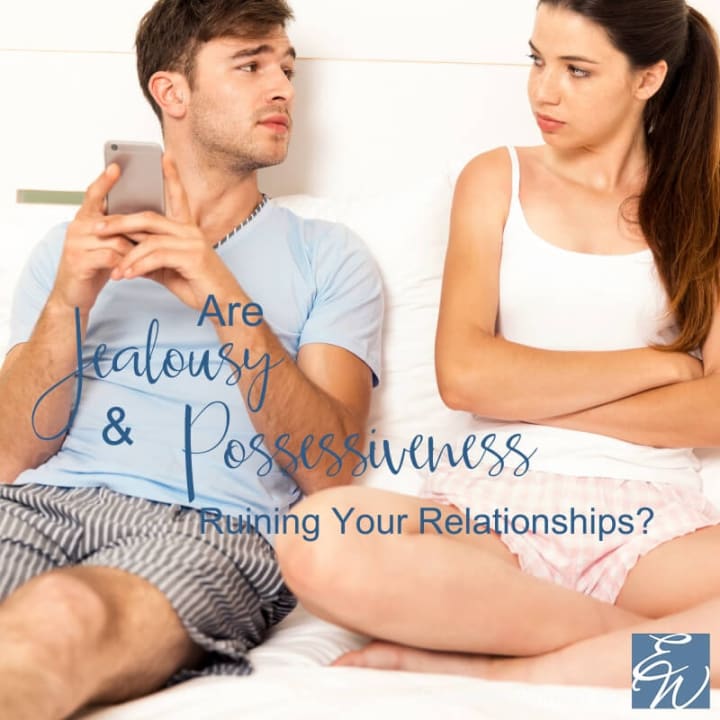Good Dating Advice for Dealing with Jealousy and Possessiveness
Know How to Manage Jealousy and Possesiveness in Your Relationship

Jealousy and possessiveness are emotions that can arise in romantic relationships and can be destructive if not managed properly. Jealousy is an emotional response to perceived threats to a relationship or to one's own self-esteem. It can be triggered by a variety of things such as a partner giving attention to someone else, a partner's past experiences, or insecurities about one's own worth. While a small amount of jealousy is normal in relationships, excessive jealousy can be toxic and cause harm to both partners.
Possessiveness, on the other hand, is an excessive desire to control or claim ownership over a romantic partner. This can involve restricting a partner's freedom, demanding constant attention, or becoming angry or upset when a partner interacts with others. Possessiveness can be a manifestation of jealousy and can also lead to toxic and harmful behavior in a relationship.

Both jealousy and possessiveness can be damaging to relationships and it's important for partners to communicate openly and honestly about their feelings and to work together to manage these emotions in a healthy way. If left unchecked, jealousy and possessiveness can lead to resentment, mistrust, and can ultimately harm or even end a relationship.
Remember, jealousy and possessiveness can be toxic and destructive to a relationship if not managed properly. It's important to work through these emotions in a healthy and constructive way to ensure a strong and lasting bond with your partner.
Good Dating Advice for Dealing with Jealousy and Possessiveness:
Make Open Communication
Discuss your feelings with your partner and listen to their perspective. Being open and honest about what's bothering you can help to resolve conflicts and build trust.
Address the root cause
Try to identify the underlying reasons for your jealousy or possessiveness. Is it a fear of losing your partner or a lack of self-esteem? Understanding the root cause can help you work through these emotions in a healthy way.

Practice self-reflection
Take time to reflect on your own thoughts and behaviors. Ask yourself if your actions are coming from a place of love or fear.
Build self-confidence
Work on building your self-esteem and self-confidence. This can help to reduce feelings of jealousy and possessiveness, as well as improve the overall health of your relationship.
Set boundaries
It's important to set boundaries in a relationship and to respect each other's independence. This can help to reduce feelings of jealousy and possessiveness.

Trust your partner
Building trust is key to a healthy relationship. Try to have faith in your partner's feelings for you and their commitment to the relationship.
Seek outside help
If you're struggling with jealousy and possessiveness, consider seeking the help of a therapist or counselor. They can provide you with support, tools, and strategies for managing these emotions.
Focus on your own happiness
Instead of focusing on what your partner is doing, focus on your own happiness and well-being. Engage in activities that bring you joy and fulfillment.
Practice empathy
Try to understand your partner's perspective and put yourself in their shoes. Empathy can help to reduce feelings of jealousy and increase understanding and compassion in a relationship.
Challenge negative thoughts
Be mindful of negative thoughts and try to challenge them. Remind yourself of your partner's love for you and the strengths of your relationship.
Avoid comparison
Comparing yourself to others can increase feelings of jealousy and insecurity. Instead, focus on your own unique qualities and strengths.
Foster mutual respect
Treat your partner with respect and encourage them to do the same. Respecting each other's feelings, thoughts, and actions can help to reduce feelings of jealousy and possessiveness.
Take breaks when needed
If feelings of jealousy or possessiveness become overwhelming, it may be helpful to take a break from the situation or take some time for yourself. This can help you to regain perspective and manage your emotions in a healthier way.
Celebrate each other's successes
Celebrate your partner's successes and support them in their goals and aspirations. This can help to foster a sense of pride and respect in the relationship.
Prioritize your relationship
Make time for your relationship and prioritize it in your life. This can help to strengthen the bond between you and your partner and reduce feelings of jealousy and possessiveness.
Good Dating Advice Frequently Asked Questions (FAQs)
Q: How do I know if my partner is the right one for me?
A: There's no one answer to this question as it varies from person to person. However, some signs that your partner may be the right one for you include mutual respect, shared values, compatibility, and a deep emotional connection. Trust your instincts and listen to your heart, and don't be afraid to communicate openly with your partner about your feelings and expectations.
Q: How do I communicate effectively with my partner?
A: Communication is key to a healthy relationship. Here are some tips for effective communication: listen actively, avoid assumptions, be clear and direct, express your feelings and needs, and be open to hearing your partner's perspective. It's also important to choose a good time and place to have conversations and to approach them with a non-judgmental attitude.
Q: How do I deal with disagreements in my relationship?
A: Disagreements are a natural part of any relationship. To deal with them effectively, try to approach them with a calm and respectful attitude, listen to your partner's perspective, and find a compromise that works for both of you. Avoid attacking your partner's character or using hurtful language, and instead focus on finding a solution that addresses both of your needs.
Q: How do I handle jealousy in my relationship?
A: Jealousy can be a normal and natural emotion in a relationship, but it's important to manage it in a healthy way. Try to identify the root cause of your jealousy, communicate openly with your partner, and work on building your own self-esteem and self-confidence. It's also important to trust your partner and to respect each other's independence.
Q: How do I know if my relationship is moving too fast?
A: Every relationship moves at its own pace, but it's important to make sure that both partners are comfortable and on the same page. If you're feeling overwhelmed or unsure about the speed of your relationship, communicate your concerns with your partner and take things at a pace that feels right for both of you.
Q: How do I handle long distance relationships?
A: Long distance relationships can be challenging, but with effort and dedication, they can also be successful. To make a long distance relationship work, it's important to communicate regularly and openly, set realistic expectations, and make an effort to stay connected through regular visits or virtual communication. Trust and understanding are also crucial in maintaining a strong relationship while apart.
Q: How do I know if my partner is the right person to marry?
A: Deciding to get married is a big step, and it's important to make sure you're marrying the right person for you. Consider factors such as compatibility, shared values, and a deep emotional connection, and be honest with yourself about your long-term goals and expectations for the relationship. It's also important to discuss these topics with your partner and to make sure you're both on the same page.
Q: How do I handle disagreements about finances in my relationship?
A: Money can be a sensitive topic in relationships, but it's important to address disagreements about finances openly and honestly. Start by discussing your financial goals and priorities, and be willing to compromise and find solutions that work for both of you. It may be helpful to work with a financial advisor or attend a money management workshop together to help you both make informed decisions about your finances.
Q: How do I deal with in-laws and other family members in my relationship?
A: Dealing with in-laws and other family members can be a challenge, but it's important to find a way to maintain healthy relationships with both your partner and their family. Communicate openly and honestly with your partner about any concerns you have, and be willing to compromise and find solutions that work for both of you and your extended families. Show respect and understanding for your partner's family and try to build positive relationships with them.
Q: How do I handle the stress and pressure of dating?
A: Dating can be stressful and overwhelming, but it's important to manage stress in a healthy way. Prioritize self-care, engage in activities that bring you joy, and talk to a trusted friend or counselor if needed. Remember that dating is an opportunity to get to know someone and enjoy their company, and that it's okay to take things at your own pace. Don't be afraid to set boundaries and prioritize your own well-being in the process.
Q: How do I know if my partner is cheating on me?
A: Cheating can be a devastating experience, but it's important to address any concerns you have openly and honestly. Observe your partner's behavior and pay attention to changes in their patterns, but also consider the possibility that there may be other explanations for their behavior. If you suspect cheating, communicate your concerns with your partner and be willing to hear their perspective. If necessary, seek the advice of a trusted friend, counselor, or therapist.
Q:How do I know if my partner is emotionally unavailable?
A: Emotional unavailability can make it difficult to form a deep and meaningful connection with your partner. Observe your partner's behavior and pay attention to their level of emotional engagement in the relationship. If you suspect emotional unavailability, communicate your concerns with your partner and be willing to hear their perspective. It's also important to seek the advice of a trusted friend, counselor, or therapist if needed.
Q: How do I handle a break-up gracefully?
A: Break-ups can be a painful and difficult experience, but it's important to handle them with grace and respect. Be honest and direct with your partner about your feelings and intentions, and try to avoid blaming or attacking them. Allow yourself time to grieve and process the loss, and consider seeking the support of a trusted friend, counselor, or therapist. It's also important to prioritize your own well-being and to focus on moving forward in a positive and healthy way.
Q: How do I know if my partner is truly sorry after a fight or argument?
A: It can be challenging to determine if a partner is truly sorry after a fight or argument, but there are some signs to look for. Pay attention to their body language and listen to the words they use, and observe if they take meaningful steps to make amends and repair the relationship. Trust your instincts and consider the level of sincerity and effort they put into making things right. Communication is key in resolving conflicts, so be open to talking about the situation and finding a solution together.
Q: How do I handle a partner who is always critical or negative?
A: Dealing with a critical or negative partner can be difficult, but it's important to communicate your concerns and set boundaries to maintain your well-being. Try to approach the situation with a non-judgmental attitude, and listen to your partner's perspective. Consider seeking the advice of a trusted friend, counselor, or therapist to help you both navigate the situation. It's also important to focus on building positive and supportive communication in the relationship.
These are just a few of the many questions and answers related to good dating advice.
Final Thoughts
Every relationship is unique, and the good dating advice is to communicate openly and honestly with your partner to overcome challenges and build a strong and healthy relationship.





Comments
There are no comments for this story
Be the first to respond and start the conversation.